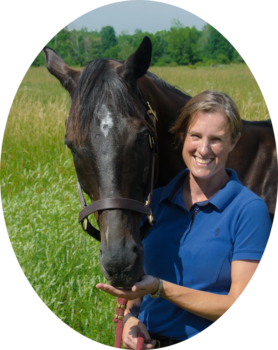Riding instructors, raise your hand if you’ve experienced this scenario: You have a student tacking up for a lesson and their parent approaches you. They express frustration that their child doesn’t try hard enough, isn’t dedicated enough, doesn’t win enough at shows. You know that the student likes to ride, but couldn’t care less if she has ribbons on her stall door. Or maybe you even know that she wouldn’t ride at all if given the choice. How do you handle parents whose goals for their child are out of sync with the goals the child has? Many instructors are frustrated by parents who push their children too hard to win in competition or even to ride at all. How can we make sure that our students are pursuing goals they genuinely want to achieve, rather than going through the motions to satisfy someone else’s agenda?
First of all, it’s important to define your role in solving your students’ struggles. It’s common for riding instructors to get drafted into being amateur tack room family therapists. Mom complains to you that her teenaged daughter has become impossible to talk to; teenaged daughter comes in sobbing that her mother never listens to her. It inevitably spills over into the student’s riding. How much involvement do you want to have in these situations? Do you prefer to stay out of it altogether, keeping the role of the instructor who shows up to teach the lesson or coach at the show, or do you see it as your responsibility to mediate these conflicts when they affect the student’s riding? There is no one right answer to this question, but answering it for yourself can help you to be clear about how you want to proceed when you see a problem. If you do get involved, the following steps can help to ease the tension.
Goal-setting meetings are one way to spell out clearly what parent and child expect from riding. This can be a formal sit-down talk where the goals are written down and well-defined, or it can be a casual chat at the beginning of a riding lesson. Ask some really fundamental questions: Why are you riding? What do you like about it? What do you dislike? If you show, what do you like or dislike about that? Where do you want to be at the end of the summer/in 6 months/in one year? Really push for specifics: if they tell you they ride because it’s fun, find out what is fun about it. Do they love jumping, or do they love being with their friends? Do they love to compete or are they happy spending hours brushing their pony? If they tell you they love to show but they’re in tears every time, ask them about this. Find out as much as you can about what motivates the child. Then have the same conversation with the parent: Why do you want your child to ride? What do you want her to learn from it? If you want her to show, what do you think she should get from that experience? Do you think your child wants the same things from riding that you want for her? If you know a parent and child are at odds with their goals, you may want to have separate conversations with each of them and then talk about it together. If possible, highlight the similarities between their goals. Parent may want child to win and child may only want to be with her friends at the shows, but they both want child to have a good ride while she’s there. If the child doesn’t want to show at all but the parent wants them to do so, you might suggest a lighter show schedule or “taking a break” from showing until the child shows greater interest. You can point out to the parent that kids’ interest in riding and competing tends to vacillate over time, and the child will perform better if her heart is in it. In the meantime, you can point out the other benefits of riding: exercise, positive body image, discipline, care for something other than herself.
In competition, one way to keep ribbon-focused parents in check is to articulate process goals for your students and discuss them with both the riders and their parents. Ribbons are result goals, and are only marginally in our control: we may ride our best, but someone else’s best may be better than ours on any given day. Process goals are specific skills and behaviors that riders need to get results: seeing a distance to the fences, getting a smooth flying change, keeping their seat in the extended trot, handling a horse’s misbehavior calmly. I make sure my students and their parents have process goals firmly in mind when they go to an event, and I remind them that focusing on these will lead to good results. When a parent gets overly focused on a child’s placing, I remind them of the process goal: “Yes, that score needs to be higher in order for her to get a ribbon. She got closer to that today when she nailed all of her transitions in the test.” I also highlight the more intangible qualities that the student shows: “That was true grace under pressure when her horse bucked and she brought him back and still nailed her distance to the next fence.” Parents are under a lot of daily pressure to ensure that their children are “successful” in the world, and they are constantly comparing themselves to other parents by evaluating how their child is doing in comparison to others. Riding can become another way of building a resume instead of a rewarding activity for its own sake. In the world of my-twelve-year-old-has-her-college-essays-already-written-what-can-your-kid-do, parents sometimes forget that the journey is the point. A gentle reminder that their child is making progress and is happy can make a big difference.
Often, parents (usually moms) who push their kids to ride are doing so because they want to be in the saddle themselves. These women were usually horse-crazy in childhood but feel it’s frivolous or selfish to start riding again. They’re disappointed when their daughters don’t love horses as they did. “I would have killed for a mom like me!” is a common refrain from these mothers. The only real solution is to get them riding, by hook or by crook. I always try the direct route first: “You sound like you’re dying to ride yourself, why don’t you take a lesson this weekend?” If that doesn’t work, I get sneaky. Sports seasons are a perfect time for this: “You know, I really can’t hold that after-school spot for Susie for the six weeks of soccer. Maybe you could take her place while she’s playing and then she can have the spot when the season is over?” Or use the child’s growing social life to your advantage: “Susie’s sleeping over at a friend’s house? Why don’t you take her lesson time this week since you’re kid-free?” Or make a barn party of it: have a Mothers’ Riding Day, or have a fun day where the kids watch their moms get on their horses. One barn I know does Girls’ Night Out lessons once a month, complete with margaritas afterwards. Once they see other women doing it, they’re often willing to join in and satisfy their own need for saddle time.
Sometimes there’s a parent who just won’t quit: their criticism is relentless, they’re ultra-competitive, they can’t see their child’s needs because their own are in the way. You’ve tried to intervene and have been told to back off. The child is miserable. In these cases, consider yourself a port in the storm. You can’t fix the parent-child relationship, but you can help inoculate the child against the damage. I have a student whose father threatens to sell her horse every time she has difficulty at an event (but enthusiastically attends all of her basketball games). I’ve long since given up on changing his behavior. Instead I tell the student, “Your dad loves you, but he just doesn’t get the horse thing. You know what you’ve accomplished this weekend, and you know how hard this sport is. His opinion doesn’t define who you are.” I’m careful not to undermine their relationship or put her father down, but I try to give her some perspective so that she can see herself through more objective eyes. Sometimes that’s the best we can do.
Don’t underestimate the power that your support can do for a child, even if they are stressed and pressured by a parent. One of my former students came home from college recently and said, “You raised me as much as my parents did. And you kept my mom and me from strangling each other. That was no mean feat.” That was the biggest compliment I’d gotten in a long time.



